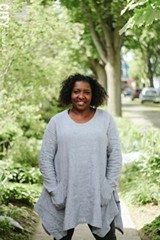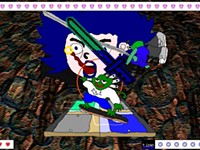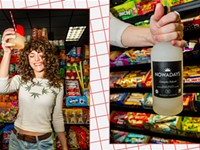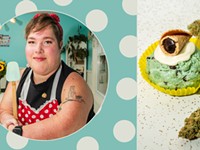[
{
"name": "500x250 Ad",
"insertPoint": "5",
"component": "15667920",
"parentWrapperClass": "",
"requiredCountToDisplay": "1"
}
]
For all of our debates over the right for women to terminate unwanted pregnancies, there's less conversation about women who decide to keep children conceived through rape. Filmmaker and Flower City Arts Center Artist-In-Residence Nicholle La Vann is creating a documentary about her own assault and her broken relationship with her daughter, in the effort to continue her process of healing. By speaking out, she hopes to start important discussions and embolden other women who have had similar experiences.
La Vann's residency at Flower City Arts Center will culminate with an exhibit on Saturday, May 27, from 6 p.m. to 8 p.m., featuring a selection of her black and white photos, a spoken word piece, and a screening of clips from "Reluctant Love: A Visual Love Letter of Healing," her film-in-progress. She's currently writing grants for funding, and seeking artist residencies and freelance opportunities to finance the documentary.
La Vann was raped when she was 15 years old, and the assault resulted in pregnancy. "Reluctant Love: A Visual Love Letter of Healing" refers to the traumatic disconnect she felt while carrying and after giving birth to her daughter.
There are as many reasons as there are stars in the sky that women choose to keep or terminate a pregnancy, and each individual decision is as complicated as the next. La Vann says that at the time, she was influenced by religious ideas and chose not to terminate her pregnancy, but rather give her daughter up through a center that placed children with adoptive families. After she witnessed the separation trauma of a girl who changed her mind, but had already signed the papers, La Vann backed out.
Because she was underage, she placed herself into foster care. "I was a child myself, and really didn't understand the impact of having a child," she says, "less even how to deal with a child. In my mind I was still this girl who ran track."
After she gave birth, La Vann struggled with feelings of regret and an unwelcome desire to hurt her kid. "She kept reminding me of this terrible act," La Vann says, "but I felt guilty, and I didn't want to act on those feelings."
This veiled corner of the wider rape trauma issue isn't much discussed; the impact of bearing and raising a child born of rape is an under-considered burden. And La Vann says she had trouble finding psychological or emotional assistance when she needed it.
Politicians and the public alike often overlook this side of reproductive rights, La Vann says. "It's like: 'Have that baby!' OK, who's gonna help after I have the baby? Can you help me mentally? Can I get some counseling? It just doesn't happen. It's the woman who's left with the bag — 'Here, have some food stamps. Run along now.' That's it."
La Vann moved in with her grandmother, who helped her navigate new motherhood.
"She knew what I was feeling without me having to say it," she says. "But I was reluctant to love my daughter in the beginning. I thought I was loving her, but I was reluctant."
When discussing this period of time, La Vann's normally bubbly personality disappears inward, her voice becomes soft and incredulous, and her expression unfathomable.
"I felt like I wanted to kill my daughter, because I felt like, 'Who is this child?'" she says. "It just felt really dirty, like something was wrong."
La Vann's previous projects, under her "Filmstress Filmz" brand, have included "Solutionz," a film that explores the effects of incarceration on children; "Homicidez," which gives voices to the families of murder victims; and "25 Years 2 Freedom," about Betty Tyson, a Rochester woman convicted of murder who was released from prison after being exonerated.
"I'm going to be 50 years old this year," La Vann says. "And I said to myself, 'I've been a force for other issues, but I've never really stood up for myself. I've always been behind the camera standing up for other people's rights.'"
In "Reluctant Love," La Vann discusses her experience as a black woman in America, her assault, and the disconnect she felt during the pregnancy and afterward. She touches on the ways she's pursued healing and empowerment through making films and by exploring her multicultural roots through the Yoruba tradition.
La Vann originally wanted the documentary to include the stories of other women whose children were conceived from rape, but the women she spoke with backed out.
Not everybody is ready to talk openly, La Vann says. "So I figured I would put myself out there first," she says. "And I have something to lose. People may never want me to do their films again, they might say, 'Oh, that's a hurt black woman, I ain't having her work on my film.' But at least they know that I had the courage to come forward, to talk about a very important issue that affects all women globally. This is a sister thing."
La Vann says that she thinks many sexual assault survivors are reticent to talk about their experiences because socially we still defend rapists and judge victims.
La Vann says she hopes "Reluctant Love" will help other women with similar experiences, who may have had a difficult time relating to their children. She also wants the film to serve as a message to her estranged daughter.
"This is my love letter and my legacy to her," she says.
When her daughter was diagnosed with bipolar disorder at age 12, La Vann didn't feel equipped to deal with it.
Her child's emotional problems began to manifest after La Vann's grandmother told her that she was conceived when her mother was raped. "I wasn't even sure if I wanted to tell her," La Vann says, "but I would have liked to have had the choice, later."
La Vann believes it's possible that her daughter's bipolar disorder might have been triggered by PTSD that erupted from this information. "I think anyone knowing such a tragic way they got in this world would be affected psychologically," she says. "There's got to be a stigma in the back of their mind, that how they were created was not in a loving way."
La Vann says that groups of assault survivors coming together for mutual, non-judgmental support could benefit many women and girls.
"There are so many women out there who are hurt, who walk by us every single day," she says. "We don't know who's broken, and sometimes we just need another person to lift us up."
Speaking of...
-

Push is on for court access for sexual assault survivors
Jan 14, 2022 -

An accused would-be art thief has a day in court
Apr 30, 2021 -
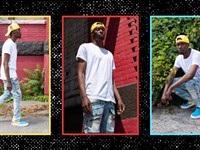
Full-hearted hip-hop
Sep 8, 2020 - More »
Latest in Culture
More by Rebecca Rafferty
-

Beyond folklore
Apr 4, 2024 -

Partnership perks: Public Provisions @ Flour City Bread
Feb 24, 2024 -
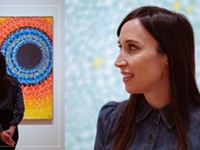
Raison d’Art
Feb 19, 2024 - More »
